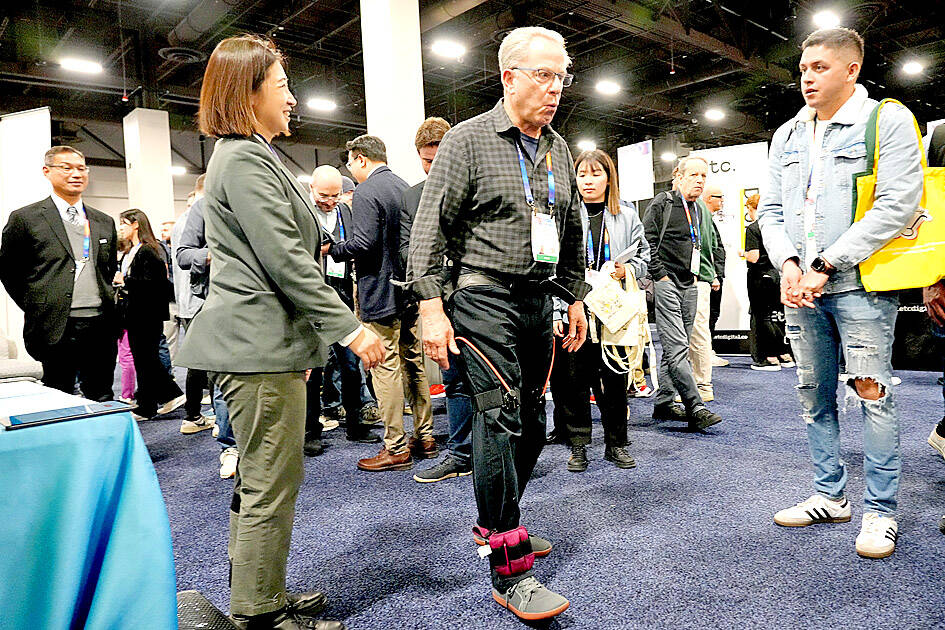The Industrial Technology Research Institute (ITRI, 工研院) yesterday said it would exhibit wellness and smart medical innovations at the Consumer Electronics Show (CES) in Las Vegas, Nevada, from today to Friday.
This year would be the institute’s ninth consecutive year exhibiting at the CES, the ITRI said in a statement.
Some of the wellness technologies on show include iSleePad, a smart sleep pad that uses noncontact sensing technology to track heart rate, breathing and sleep position, as well as its pet variant, iPetSuite, the institute said.

Photo courtesy of the Industrial Technology Research Institute
Other highlights include KneeBO, a portable knee joint exoskeleton designed for lower-limb muscle training and walking improvement, MedBobi, a generative artificial intelligence (AI)-powered smart medical assistant system, and the AI Badminton Trainer, which can capture player movements for analysis and provide personalized training programs instantly, it added.
Among the institute’s new smart medical technologies, the High-Privacy AI Digital Caregiver on display offers hospital-level accuracy for vitals monitoring and helps address healthcare workforce shortages, according to the ITRI.

In Italy’s storied gold-making hubs, jewelers are reworking their designs to trim gold content as they race to blunt the effect of record prices and appeal to shoppers watching their budgets. Gold prices hit a record high on Thursday, surging near US$5,600 an ounce, more than double a year ago as geopolitical concerns and jitters over trade pushed investors toward the safe-haven asset. The rally is putting undue pressure on small artisans as they face mounting demands from customers, including international brands, to produce cheaper items, from signature pieces to wedding rings, according to interviews with four independent jewelers in Italy’s main

Japanese Prime Minister Sanae Takaichi has talked up the benefits of a weaker yen in a campaign speech, adopting a tone at odds with her finance ministry, which has refused to rule out any options to counter excessive foreign exchange volatility. Takaichi later softened her stance, saying she did not have a preference for the yen’s direction. “People say the weak yen is bad right now, but for export industries, it’s a major opportunity,” Takaichi said on Saturday at a rally for Liberal Democratic Party candidate Daishiro Yamagiwa in Kanagawa Prefecture ahead of a snap election on Sunday. “Whether it’s selling food or

CONCERNS: Tech companies investing in AI businesses that purchase their products have raised questions among investors that they are artificially propping up demand Nvidia Corp chief executive officer Jensen Huang (黃仁勳) on Saturday said that the company would be participating in OpenAI’s latest funding round, describing it as potentially “the largest investment we’ve ever made.” “We will invest a great deal of money,” Huang told reporters while visiting Taipei. “I believe in OpenAI. The work that they do is incredible. They’re one of the most consequential companies of our time.” Huang did not say exactly how much Nvidia might contribute, but described the investment as “huge.” “Let Sam announce how much he’s going to raise — it’s for him to decide,” Huang said, referring to OpenAI

The global server market is expected to grow 12.8 percent annually this year, with artificial intelligence (AI) servers projected to account for 16.5 percent, driven by continued investment in AI infrastructure by major cloud service providers (CSPs), market researcher TrendForce Corp (集邦科技) said yesterday. Global AI server shipments this year are expected to increase 28 percent year-on-year to more than 2.7 million units, driven by sustained demand from CSPs and government sovereign cloud projects, TrendForce analyst Frank Kung (龔明德) told the Taipei Times. Demand for GPU-based AI servers, including Nvidia Corp’s GB and Vera Rubin rack systems, is expected to remain high,